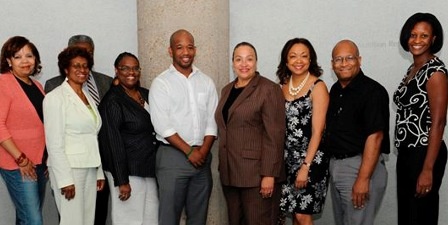PART I: Long After Tuskegee, Blacks Still Leary of Clinical Trials
By Pharoh Martin
NNPA National Correspondent
 Participants in the University of Maryland Bioethics Research Center-NNPAF Bioethics Fellowship(Left to right): Linnie Frank Bailey, Black Voice News; Dr. Margo Hall, Bioethics Fellowship Program consultant; Elaine Hegwood Bowen, Chicago Crusader; Pharoh Martin, NNPAF; Dr. Claudia Baquet, director of the University of Maryland National Bioethics Research Center; Joan Allen, the New York Daily Challenge; Gordon Jackson, Dallas Weekly; Rhetta Peoples, the Florida Sun. Standing in back is James Alexander, National Cancer Institute public affairs specialist. Participants in the University of Maryland Bioethics Research Center-NNPAF Bioethics Fellowship(Left to right): Linnie Frank Bailey, Black Voice News; Dr. Margo Hall, Bioethics Fellowship Program consultant; Elaine Hegwood Bowen, Chicago Crusader; Pharoh Martin, NNPAF; Dr. Claudia Baquet, director of the University of Maryland National Bioethics Research Center; Joan Allen, the New York Daily Challenge; Gordon Jackson, Dallas Weekly; Rhetta Peoples, the Florida Sun. Standing in back is James Alexander, National Cancer Institute public affairs specialist. |
(NNPA) – The general distrust that African-Americans have of clinical trial research goes back a long way. History tells them that it would be in their best interests to not participate but the reality is that Black participation in clinical research is critical because African-Americans disparately suffer from some of the highest disease rates and respond differently to many treatments. Researchers like Dr. Claudia Baquet, associate professor of epidemiology and preventive medicine at the University of Maryland School of Medicine and director of its National Bioethics Research Center, wants to not only foster public trust among African-Americans for research, but also stress the importance of participating in such research.
"The reason that this is so important is that we know that the public has a lack of trust in research and also in academic institutions," said Baquet, one of the few Black clinical researchers in the country. "We know that African-Americans and other under-served communities do not participate in medical research or clinical trials at the same rate of the general population.We feel that the lack of diversity in clinical trial participation contributes to health disparities. Plus, it affects our ability to develop new ways to prevent, diagnose or treat illness."
The National Center of Minority Health Disparities, which is a part of the National Institute of Health, provided Baquet a $2.5 million dollar grant to establish a national bioethics research center at the University of Maryland School of Medicine in Baltimore and attempted to remove the stigma and mysteries associated with medical research within minority and under-served rural communities. The two-year grant is funded by the stimulus funding passed by the U. S. Congress last year.
Among the educational programs, Baquet established a partnership with the National Newspaper Publishers Association Foundation in order to encourage Black Press Reporters to explore the issue of clinical trials and report on the impact of the issue in 2010. Six reporters participated in the exploration. That includes five from around they nation, who applied and were selected as fellows, who spent two days at the University of Maryland. They were: Joan Allen of the New York Daily Challenge; Linnie Frank Bailey of Black Voice News in Riverside, Calif.; Elaine Hegwood Bowen of the Chicago Crusader; Gordon Jackson of the Dallas Weekly; and Rhetta Peoples of the Florida Sun in Orlando.
NNPA National Correspondent Pharoh Martin, the writer of this story, also participated.
The reporters studied how African-Americans could benefit from clinical trials and the fear that still prevail.
Baquet has also been setting up community educational programs on bio-ethics in Maryland called "mini-medical schools". The community attends a four-week medical school. They are taught some core research methods involving ethics, its history of scandals and tragedies, the federal regulations that came about to protect participants and the application of those protections such as the importance of informed consent, the knowledge level of a person participating in a clinical trial.
Students also receive lessons on health care problems that affect their communities such as HIV/AIDS, hypertension, diabetes and the need for vaccines. The approach is multi-level; so in addition to educating the public researchers also educate community physicians and nurses. "There is still the persistent concern about research abuses and scandals that have happened in the past such as the Public Health Service's study of untreated syphilis in Tuskegee, Alabama, which recruited African-American men in Tuskegee who were promised treatment for syphilis," Baquet said. "Even after penicillin was identified as a cure the treatment was withheld from them by the federal government. So there is still the persistent fear and concern about being treated like a Guinea Pig and not understanding that research has a role to play in improving the health of the community."
Because of the historical concerns of events like the Tuskegee experiments and others, lecturers go through intense efforts to explain how federal regulations resulted from such scandals to protect individuals who participate in clinical trials so that similar incidents are not repeated.
Baquet said, "By promoting research literacy, it breaks down those barriers and the historical distrust that the literacy it breaks down those barriers and the historical distrust that the African-American community has had of research and of researchers."
Part II: Doctors Find Ways to Stop African-American Resistance to Clinical Trials
Part III: The Bioethics Sins of a Nation Being Rectified




















































































































































































































































































































